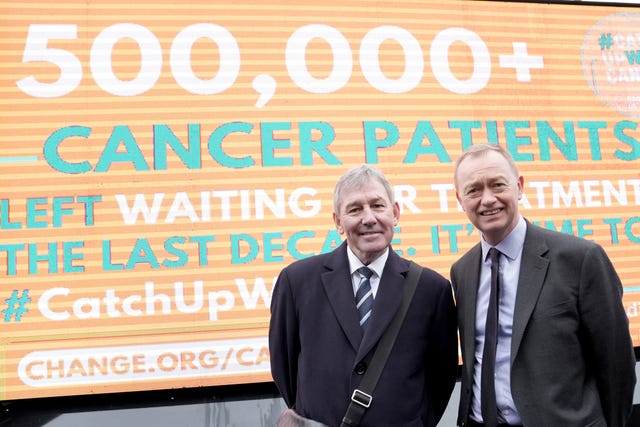Former England captain Bryan Robson says cancer care should be national priority
The ex-footballer, who was known as ‘Captain Marvel’, had treatment for throat cancer in 2011 while managing the Thailand national men’s team.

Former England and Manchester United captain Bryan Robson spoken of the importance of early cancer detection, and said the Government should focus on improving cancer care.
Mr Robson, who was known as “Captain Marvel” during his 22-year playing career, had treatment for throat cancer in 2011 while managing the Thailand national men’s team. He had radiotherapy and made a full recovery.
He has since become a patron for Radiotherapy UK, a charity campaigning to improve access to the treatment in the UK.

Speaking at an event run by the charity to mark World Cancer Day, he urged people to attend screening appointments and to get checked if they have any symptoms.
He said: “It’s great for when you’re getting to that age to get that check-up, because you never know what they’ll find. Because early detection, as they say, that’s the most important thing.”
Mr Robson made 461 appearances for Manchester United during his 13-year career with the Red Devils, scoring 99 goals. The combative midfielder marked the end of his United career by winning two Premier League titles.
He also had successful spells as a player and manager for both West Bromwich Albion and Middlesbrough.
With England, he captained the side for 65 games, becoming a mainstay of the team during international campaigns throughout the 1980s.
The 68-year-old said his cancer diagnosis nearly 15 years ago came as a shock.
“I felt fit and healthy,” he said. “I had a bit of a swelling in my throat and I just thought I had a sore throat.
“I went to see a specialist over the road from where I lived and he shined a torch down me, and said ‘I’m terribly sorry, Mr Robson, that doesn’t look like a sore throat to me, it looks like a tumorous cancer growth’.
“The same day he got me in, got me an MRI scan, spoke to his people who are specialists and everything and said yes, it was a tumour.
“I was just so lucky that they caught it so early, but it really shocked me, because I used to go to the gym every morning in Thailand. I felt really fit, so I just didn’t expect anything like that.”
He added that the Government, which announced on Tuesday that it is asking experts, patients and medics to shape a national cancer plan, should put resources into improving cancer diagnosis and treatment.
He said: “I know that the Government have a really difficult job because they are always having to fund all different aspects of life, but I think, when you come to cancers and illnesses, you can’t get anything much more important than saving people’s lives.
“That should be more or less a priority because you’re saving people’s lives.”
Specialists have said the Government needs to be “radical” with its plans for the future of cancer care and diagnosis, and said ministers already have information that could help them shape their plans.
Professor Pat Price, an academic clinical oncologist who is chairwoman of Radiotherapy UK, said 500,000 patients have missed the 62-day treatment target for cancer in the last 10 years.
She said: “We are missing the targets left, right and centre. It’s great that they’ve announced the national cancer plan – our concern is that in 2022 a cancer plan was announced and that got lost in the wash, so we are really hoping the Government will deliver on this.
“We have got to be absolutely radical. Cancer survival and delays have fallen off a cliff, and we are so far behind and, really, unless we take this opportunity now, we will have this same situation for the next 10 years.”
She added: “One in two people get cancer, it’s everybody, everybody’s got somebody, at any age. We’re predicted to have a 30% increase in cancer by 2040. We can’t cope now, what we are going to do? We’re drowning already.
“It’s got to be a Kate Bingham (head of the Covid vaccine taskforce) moment, it’s as big as the vaccine. It’s got to be a national ‘get everything out of the way and clear the barriers and just do it’ moment. Otherwise it’s going to be bad.”





